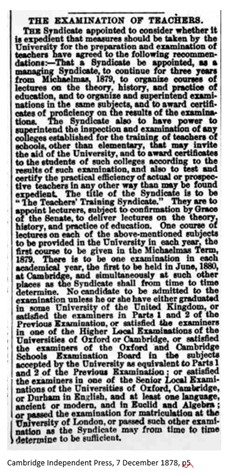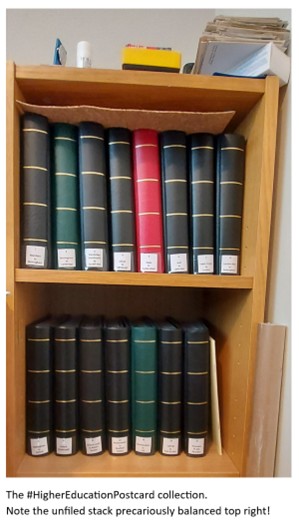Greetings from Cambridge – and unlike last week, this time we’re definitely in England.
It is 1878, and the Cambridge Independent Press of 7 December reports that the university has taken steps to enable the training of teachers. The Teachers’ Training Syndicate (its Cambridge-ese for a committee or working group, I think) is to be established, to oversee programmes of training for students intending to become school teachers, and the colleges at which they train.

All of this took place in the context of increased state engagement with school education: the provision of schools for all children was becoming increasingly necessary, and local authorities of various kinds (it’s complicated!) were empowered to fund such schools.
And it stands to reason that where you have schools, you need teachers. And by then the practice of teaching was becoming increasingly professionalised. Plus, it was one of the few professions open to women.
And so in 1885 the Cambridge Training College for Women was opened. Initially based at Newnham College, there were fourteen students, under the guidance of the college’s first principal, Elizabeth Phillips Hughes. Hughes was the first woman to gain first class honours in moral sciences at Cambridge, having studied at Newnham. (She also helped to found the Barry Teachers Training College, which ultimately became part of the University of South Wales, and helped to draft the statutes of the University of Wales). She remained principal of the new college until 1899, steering it from its modest start to a new building – that shown on the card – in 1895.
The driving forces behind the establishment of the college included Miss Frances Buss, champion of girls’ education, and one of the subjects of an anonymous verse of some fame:
Miss Buss and Miss Beale
Cupid’s darts do not feel.
How different from us
Miss Beale and Miss Buss.
Miss Beale was Dorothea Beale, suffragist, headmistress of Cheltenham Ladies’ College and one of the founders of St Hilda’s College, Oxford. And it seems that the pioneers of women’s education had a lot to put up with.
At this point Hughes Hall was not a college. (It wasn’t even Hughes Hall yet!) It was only after the university recognised women as full members (in 1947, less than a lifetime ago) that the college gained recognition as part of the university (albeit not yet a college) and was renamed Hughes Hall. This was in honour of Elizabeth Phillips Hughes, the first principal; its full name at that time was Elizabeth Phillips Hughes Hall.
It began to admit male students in 1973: the first of Cambridge’s all-women institutions to do so. In 1985 Hughes Hall became an “approved foundation” of the university (it’s the step below being a full college) and in 2006 Hughes Hall became a college of the university, with a charter and everything. And a full name – for Sunday best or when it has been naughty – of The President and Fellows of Hughes Hall in the University of Cambridge.
Hughes Hall admits only mature students (judged by age not attitude), to both undergraduate and postgraduate degrees. It still teaches education, both as an academic subject and as a PGCE, as well as programmes across other disciplines.
This post owes its origins to the eagle-eyed Professor Chris Brooke of Homerton, Cambridge, who corrected me about wat was shown on the card. I’d shared the card as one of my daily posts on Bluesky thinking it was Homerton. But it definitely isn’t!
Here’s a jigsaw of the card – hope you enjoy it.
Backstory
A couple of you have asked about the #HigherEducationPostcard backstory.
It started about ten years ago when I was in a Cardiff antiques mall, sheltering from the rain. One of the stalls had books and old postcards, and when browsing the latter I found half a dozen showing universities. Which I thought was quite cute. So I bought them.
Fast forward to 2020 and the pandemic. The first few months were scary for lots of reasons, and if you were self-employed in the HE sector the question of how to do consulting without being on site was very much front and centre. And whilst sitting at my desk trying to solve this puzzle I noticed the small stack of postcards, and thought I’d share them on Twitter. They were really popular, so I thought I could carry on doing this. But where to get postcards? eBay, mostly. And so I started bidding. And then the collection sort of growed. Its at about 1200 cards now, in fifteen albums with a stack of a couple of hundred still to be scanned and filed.

In the summer of 2020 I ran a #HigherEducationPostcard world cup on Twitter – 32 cards, paired off, the one with most votes went through to the next round. In the final, Swansea University beat van Mildert College, Durham; thousands of votes were cast, each institution getting its students, staff and alumni to join in. It was great fun!
I’d been posting daily on Twitter, and when in summer 2021 Paul Greatrix retired from weekly Registrarism blogposts on Wonkhe, I suggested that I write a weekly higher education postcard blog. The good folk at Wonkhe towers said yes, and here we are, 170 posts later. My only rule is that I have to own the actual postcard; and I try to make them interesting and informative. And mostly true. I really enjoy writing and sharing them, and have no plans to stop just yet. I hope you like them too. Thanks for reading!













I always really enjoy these, and have found myself unexpectedly excited when it is a picture of a building I know well.
Hugh, Yes we love these, long may it continue.
My favorite bit of a Friday morning Hugh!
Have to admit I was at first very disappointed when Paul G gave up his weekly Wonkhe blog but I quickly became addicted to the replacement! Keep it up please Hugh!
Hello “Postcard Hugh” as I called you at the AHEP conference last year when I was fortunate enough to meet you in person. This is definitely my favourite part of the WONKHE email – long may the postcards continue!